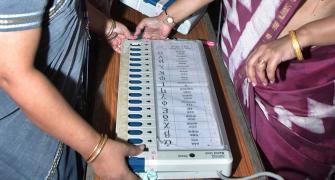With the US facing a credit crunch and worries of a recession, it seems like a bad time for South Korea's Hyundai Motor to be pursuing a policy of global expansion. After all, winning over car buyers in the world's biggest market is crucial to the company's hopes of building a globally recognised brand.
But the US isn't all that counts, Hyundai executives say. In fact, their strategy for breaking into the industry's top five by 2011 (counting subsidiary Kia Motors' sales) relies on a rapid buildup in two of the world's fast-growing markets: China and India.
"The company's resources will be focused on expanding our presence in emerging markets this year," says Hyundai Motor vice-chairman Kim Dong Jin.
China and India made up just over a fifth of Hyundai's global sales last year. Hyundai execs want to boost that figure and raise their market share in both countries. The company expects to raise production there by more than 60 per cent this year, and by 2010 it hopes to make 600,000 cars in each country, compared with 327,000 units in India and 232,000 in China last year.
But the linchpin of Hyundai's strategy will be the transformation of its modest presence in both countries into a key design, manufacturing, and export hub for the entire global operation.
Bucking a drop in sales
It will be a huge challenge for the Korean company. Hyundai's share of the Indian market fell to 17 per cent last year from 18.2 per cent in 2006, and in China it had just 4.6 per cent, down from 6.9 per cent.
Try telling that to Hyundai's gung-ho executives. They have spent some $2 billion on two new plants, in Chennai and Beijing. The plants could determine whether Hyundai meets its own market share targets of 20 per cent of India and 6.1 per cent of China this year.
Analysts think Hyundai's success in those markets could set the tone for its push into other markets, such as Russia, the Middle East, and Africa, which are forecast to be just under a quarter of Hyundai's global sales this year.
"The litmus test will be if Hyundai will secure a market share exceeding 5 per cent in China this year," says Yoo Young Kwon, corporate analyst at Prudential Investment & Securities.
In India Hyundai is already the second-biggest car brand. It's also the country's largest exporter of passenger cars. In 2007 the company shipped 127,000 cars from India, accounting for about two-thirds of the country's annual car exports tally.
That doesn't mean Hyundai has done everything right. Until the new Chennai plant went online Hyundai's production capacity in India was just 300,000 cars. While Hyundai was ramping up its capacity, Maruti Suzuki India, a subsidiary of Japan's Suzuki Motor, added two more percentage points to grab 52.4 per cent of the market last year.
India: Hub for small car exports
Hyundai execs stress the Chennai plant's importance in their global plans. The company expects to export half the 530,000 cars it will build in India this year. With the plant's rollout in November of a new small car, called the i10, Hyundai became the first foreign carmaker to develop and produce a model in India for sale around the world.
"The new plant cements India as our export hub for small cars," says H S Lheem, managing director of Hyundai Motor India.
Unlike the $2,500 Nano unveiled earlier this month by Tata Motor, Hyundai's i10 meets stringent safety and environmental requirements in Europe and other developed markets.
Lheem also sees it as a way to go after wealthy, thirty-something Indian professionals who can afford a fully loaded model's relatively steep $11,000 price. So far, i10 sales have been encouraging, topping 11,000 in the car's first two months on the market. In January it swept all four Car of the Year awards in India. "This sets us apart from rivals that tend to bring in old models to India to lower costs," Lheem says.
In China, Hyundai has even bigger challenges ahead. In 2007 it was virtually the only major automaker to suffer a sales decline in China, where car sales overall grew a whopping 22 per cent. Beijing Hyundai Motor, Hyundai's joint venture in China, posted a 20 per cent drop in sales to 232,000, from 290,000 in 2006.
Industry officials largely blame a lack of new models and Hyundai chairman Chung Mong Koo's corruption trial. The 2006 case against Chung prompted Beijing authorities to delay approval of Hyundai's plans for its Beijing plant - the company's second facility in the Chinese capital - for nearly a year.
China revival depends on new compact
Hyundai's decision against price cuts last spring, after an 18.4 per cent appreciation in the Korean currency over the past two years, also put the carmaker at a disadvantage against the big discounts offered by rivals.
As Hyundai dithered, Toyota, Honda, Nissan, and Volkswagen all released a slew of new models in the world's fastest-growing car market. "It was a blunder on our part," says a Hyundai senior manager about the company's decision to wait until fall to cut car prices by up to 13 per cent. "We were not well prepared in the fiercely competitive China market last year, but we have learned a lesson."
To reverse its fortunes in China - and move up in the industry rankings - Hyundai is readying a new compact car model. Code-named HDC, the first vehicles are slated to roll off the line at the new Beijing plant starting from April, says Noh Jae Man, president of Beijing Hyundai.
The HDC marks a new approach for Hyundai in China: designing vehicles to appeal to local tastes. "Our engineers and. . . our suppliers here worked for 18 months to transform our new Elantra into a China-style model," Noh told BusinessWeek in a phone interview.
Two more models for China will follow. Hyundai also plans to ship from Korea its luxury Genesis sedan, in an attempt to go head-to-head with the BMW 5 Series and Mercedes-Benz E-Class.
The HDC will be Hyundai's first for China's compact segment since 2004, and the company's designers set out to make a statement. After extensively surveying Chinese consumers and industry consultants, designers gave the HDC bigger headlamps and a flashier grille for a look that distinguishes it from its competition: the Toyota Corolla, Honda Civic, and Volkswagen Jetta. Engineers also hardened the Elantra's suspension for tighter control while tweaking the engine to improve gas mileage by 8 per cent.
What do analysts make of Hyundai's plan? Some remain wary of taking the company's targets at face value. "Hyundai normally sets an overly ambitious goal and then revises it downward later," says Stephen Ahn, auto analyst at Woori Investment & Securities. "But even if it meets 80 per cent of its target, that would be a decent achievement."






